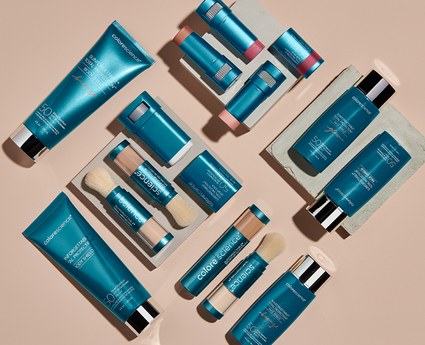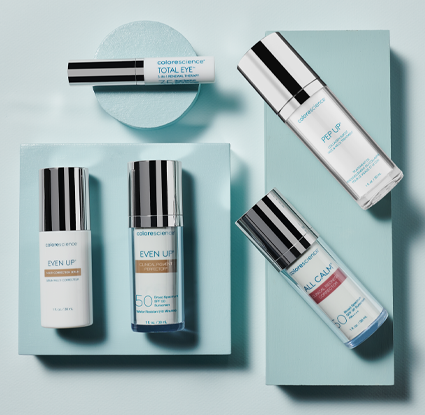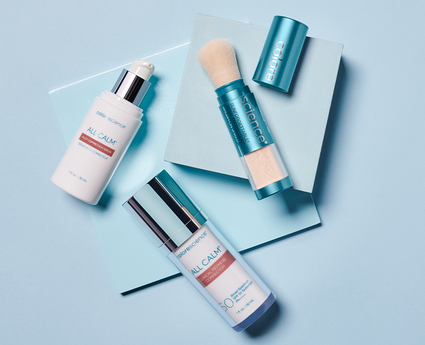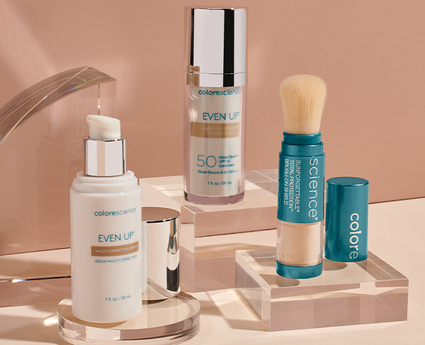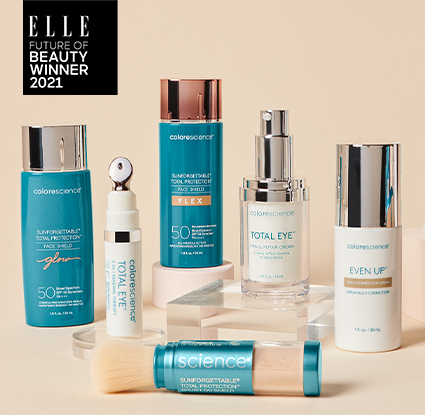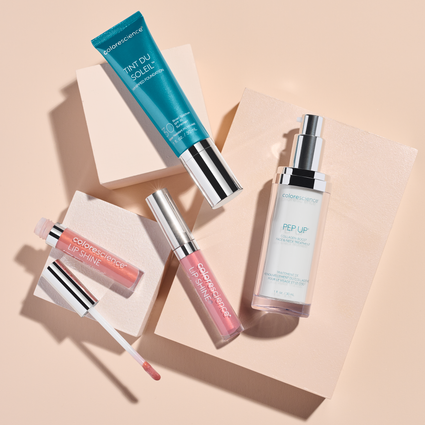What the Skin Barrier Is & Why You Need to Protect It
Your skin barrier is your body’s first line of defense against environmental factors like UV rays and pollutants. It also plays a role in keeping viruses and bacteria out of the body.
That’s why it’s essential to maintain a healthy skin barrier.
But how do you do that? Keep reading to learn more about the skin barrier, how it works, how to recognize the signs of damage, and how to keep it healthy.
- What Is the Skin Barrier?
- What Is the Skin Barrier’s Function?
- What Does a Healthy Skin Barrier Look Like?
- Signs Your Skin Barrier May Be Damaged
- What Can Damage the Skin Barrier?
- 9 Tips for How to Protect Your Skin Barrier
What Is the Skin Barrier?
The skin barrier is the outermost layer of your skin and has the job of protecting your body from the world at large. It's also known as the stratum corneum, and it's made up of cells called corneocytes.
These cells are joined together by lipids, which is a type of fat your body produces for use in maintaining the structure of your skin. Lipids act as a kind of glue to hold your corneocytes in a brick wall-like structure, creating a flexible skin barrier.

All of these elements come together to create the skin barrier that provides you with protection against damage, keeps your skin from drying out, and helps with healing after a minor injury. This is why it's important to keep your skin healthy internally and externally for proper skin barrier function.
The skin barrier is also a microbiome, or home to microorganisms that help maintain the health of your skin. These microorganisms aid the immune system and skin barrier in their defense against unwanted viruses and bacteria. Maintaining a healthy skin barrier helps your skin maintain itself, keeps your microbiome healthy, and boosts the protection it provides against the outside world.
What Is the Skin Barrier’s Function?
The main skin barrier function is that of protecting your body from the elements. Your skin is your body's largest organ, and it's home to hair follicles, glands for oil and sweating, and even your fingernails. It also keeps bacteria out of your body, helps to regulate body temperature, and protects you against UV light.
All of this work is done by a layer of skin that's about 0.001 millimeters thick. It's supported by lower layers known as the dermis, subcutaneous tissue, and muscle, but it has its own inherent strength.
The lipids and skin cells on the skin barrier come together to create an incredibly strong and tough outer layer of skin that helps you stay healthy and functional.
The skin barrier is also home to microorganisms that are beneficial to its regeneration and function. Microbial flora and fauna colonize our skin shortly after birth and remain with us throughout our lifetime.
These microorganisms are found in various types, populate some areas of the body more strongly than others, and help with immune responses. They're perfectly normal to have and are part of a healthy skin barrier function.
Proper skin care prevents a damaged skin barrier and helps keep you healthier all around.
What Does a Healthy Skin Barrier Look Like?
A healthy skin barrier typically:
- Has a smooth appearance
- Feels soft to the touch
- Presents with an even skin tone with little to no dark spots
- Glows from within
- Doesn’t have dry patches or flaking
- Isn’t tight or itchy
It's worth noting that the visual appearance of healthy skin is more than a calm complexion and a lack of blemishes. Some people have skin that's freckled, while others have scars or dermatological issues that visually disrupt the appearance of the skin.
What we’re saying is it's possible to have these issues and still have healthy skin. If you’re concerned about the health of your skin barrier, it may be worthwhile to schedule an appointment with your dermatologist to get their professional opinion.

Signs Your Skin Barrier May Be Damaged
As with most things when it comes to your body, there are signs to look for that will clue you in when there's a problem. Some signs of a damaged skin barrier you’ll want to look out for include:
- Redness in the form of patches or dots
- Scaly appearance and texture
- Rashes or itchiness
- Inflammation
- Dry patches of skin
These tell-tale signs of irritated skin are unwelcome, but they're also an indicator that something's not right in your skincare routine or environment.
If you notice these signs, take a step back and think about what might be causing them. Could it be your skincare products, have you been skipping that nighttime cleanse, or maybe you’ve changed your diet?
These might also be signs that you're experiencing an eczema, rosacea, and keratosis pilaris flare-up. If any of these conditions persist for more than a week, you may want to consult your dermatologist.
What Can Damage the Skin Barrier?
There are many things that can damage your skin and make it more difficult to maintain a healthy skin barrier. Here are just a few factors that can come into play:
Exposure to sunlight
This is a problem that everyone faces on a daily basis. The sun plays an essential role in our well-being, but too much exposure to UV rays damages your skin at the cellular level. When you don't wear sunscreen, you're at risk of damaging the barrier of your skin.

Overcleaning your skin
Constant washing, scrubbing, and using harsh cleansers can remove your skin's natural oils and moisture. This results in irritated skin including dry patches, flaking, redness, and other signs of damage.
Frequent exfoliation
Exfoliation is touted as a way to remove dead skin cells and freshen the appearance of your skin. Doing it more than once or twice a week increases the potential for damage that might include inflammation, scabbing, and other undesirable side effects.
Overuse of chemical peels
Peels that contain organic acids work by removing the topmost layer of your skin. They're effective and resolve many unwanted skin issues, but they can also burn your skin. Using them too frequently can damage the skin barrier with unpleasant results.
Loss of moisture from dehydration
Dehydrated skin is the result of dry weather, using harsh cleansers, too-frequent washing, and not drinking enough water. This can result in skin that's dull and dry, and lacks elasticity.
Lifestyle
The activities you engage in, the environment you live in, and the stresses you experience on a daily basis are all factors in your skin's health. Exposure to UV rays, pollution, and alcohol consumption damages the cells in your skin barrier and causes dehydration.
Acne medication
Prescription and non-prescription acne medications work by reducing the amount of bacteria and oil production on and in your skin. In some cases, they can affect the barrier of your skin by drying it out to a point where dry patches and flakes form.
9 Tips for How to Protect Your Skin Barrier
While skin damage is a serious concern, there are a lot of things you can do to protect yourself. Skin damage tends to happen in reaction to an irritant or factor. Being proactive goes a long way toward keeping it healthy. You may have to make changes in your skincare routine, but in the future, you’ll be grateful for the extra effort.

Some tips for protecting your skin barrier include:
- Applying an antioxidant cream before bed and when you're starting your day.
- Using moisturizing skin care products that contain long-lasting and active ingredients such as our Colorescience Barrier Pro™ Essential Moisturizer.
- Avoiding cleansers that contain alcohol. Our favorite is the Colorescience Barrier Pro™ 1-Step Cleanser.
- Wearing sunscreen with SPF 30 or higher and broad-spectrum protection every day.
- Reducing the use of scrubs in the form of a scrubbing pad or cleanser.
- Using foundation and makeup that doesn't contain skin-irritating ingredients.
- Improving skin hydration by drinking more water and consuming less alcohol.
- Eating a nutrient-rich diet.
As you can see, the importance of skin care can't be understated when it comes to maintaining a healthy skin barrier.
Take Your Skin Care to the Next Level
The skin barrier is a key line of defense, but it's also under constant assault from different factors that come from outside and within. It's important to take care of your skin barrier by providing it with nourishment and protection with skincare products that deliver the building blocks it needs to stay healthy. You can find both nourishment and protection with the Colorescience Barrier Pro™ Barrier Health Dream Duo.
With Colorescience, you can use safe skincare treatments with natural ingredients to keep your complexion healthy and radiant. For protection, try mineral sunscreen that’s gentle on your skin but powerful against the sun. Shop our full Colorescience Barrier Pro™ Collection of skin barrier safe products to revamp your skincare routine.

